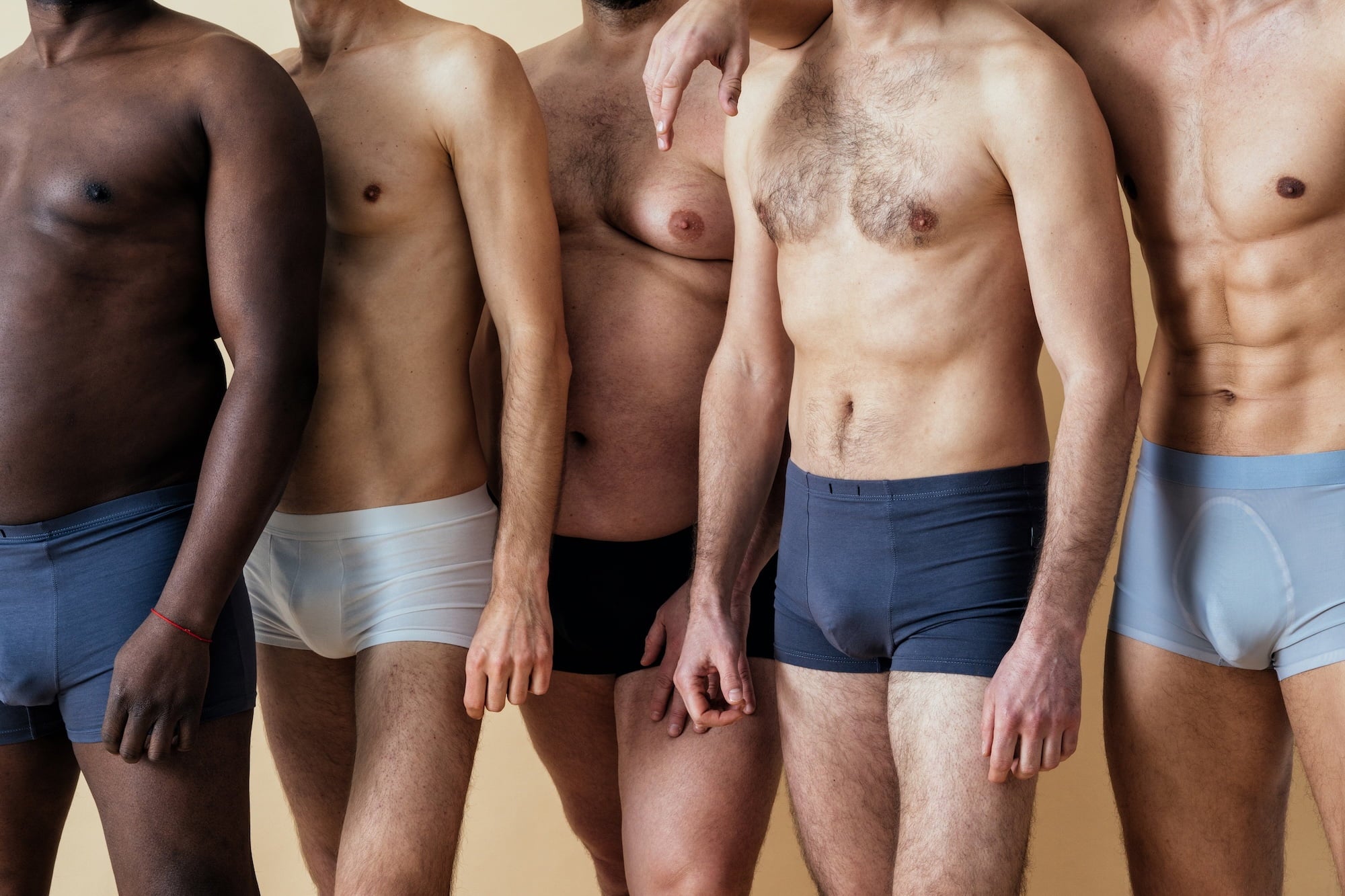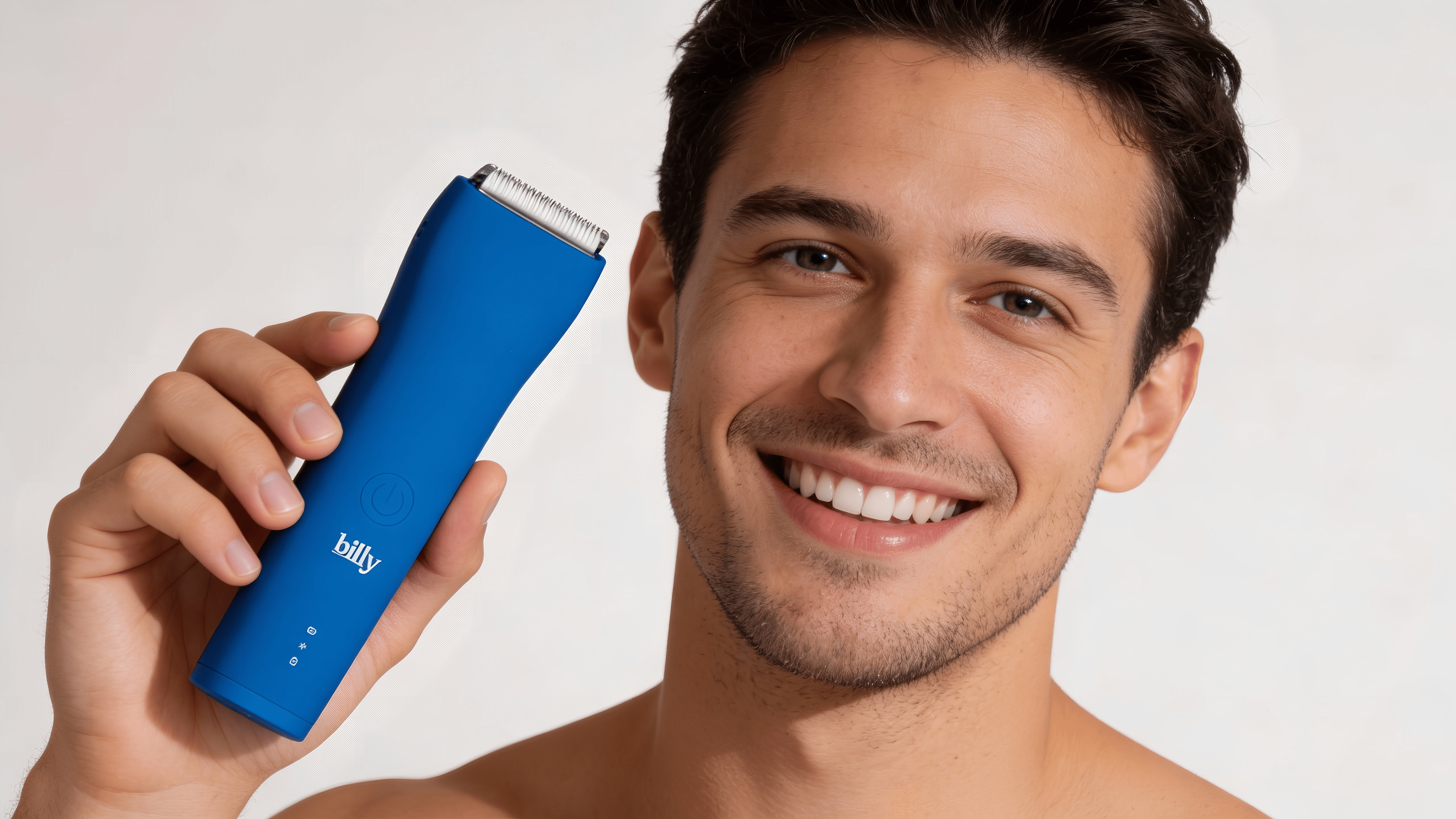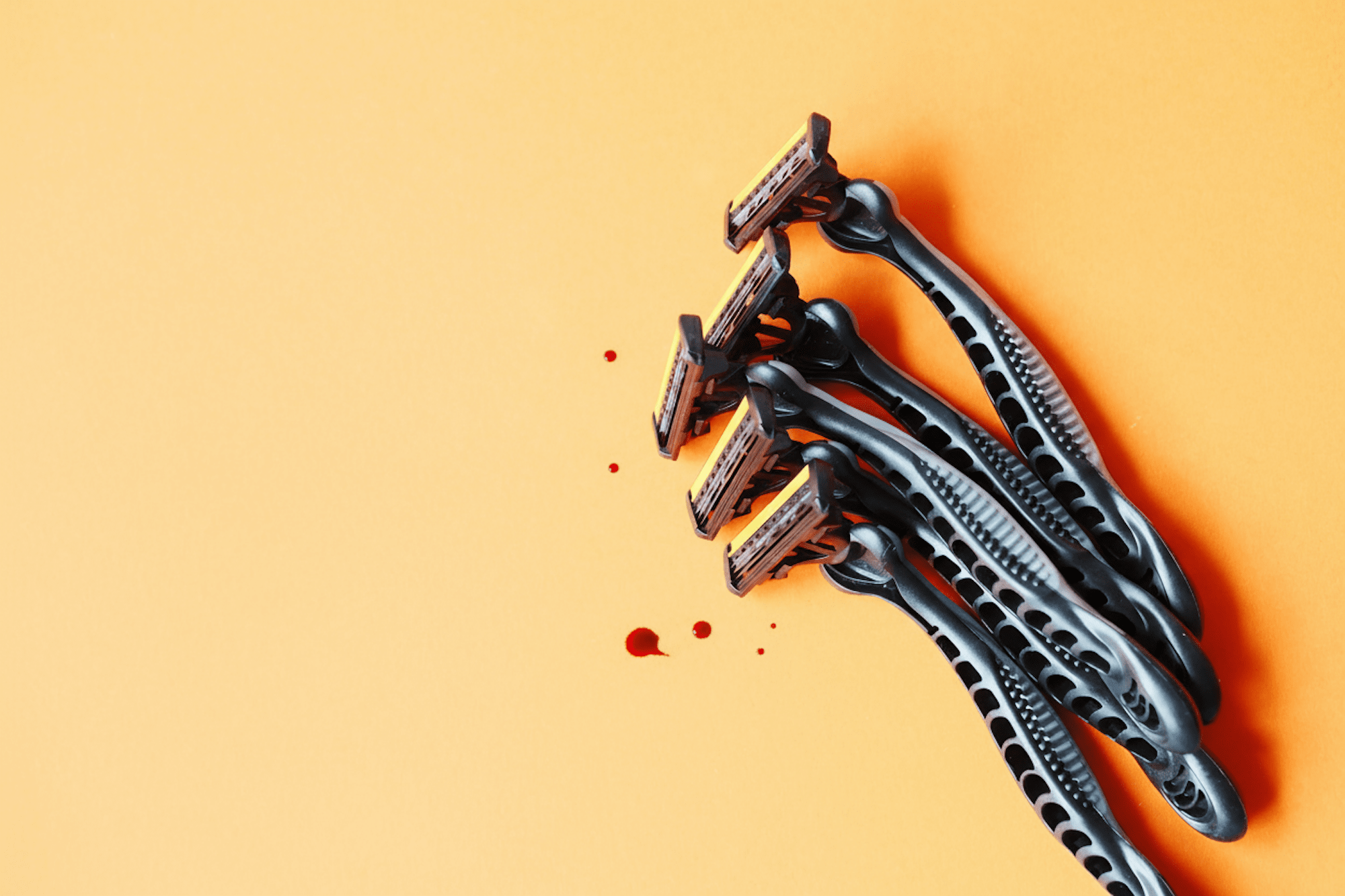Let's not lie to ourselves, insecurities are like butt hair - everyone has them, but no one talks about them! And guys, despite the constant pressure to be confident and strong "real men", are not spared. These little doubts that we keep to ourselves can really ruin our daily lives. So today, we're breaking the taboos and talking about the 10 (11) most common insecurities among men. Not to judge, just to understand and maybe give you some tips to feel better in your sneakers (and in your underwear).
Male complexes: oh yeah, men have complexes?
Honestly, a complex is just that annoying little voice in your head telling you you're not good enough. That feeling that eats away at you when you look in the mirror or compare yourself to others. For guys, it often revolves around the body, success, or that famous "masculinity" that everyone talks about but no one really defines. Do you worry about your appearance? Your job? Your ability to satisfy your partner? Welcome to the club, my friend!
Insecurities can range from minor to completely ruining your life. They can prevent you from fully enjoying a night at the beach, approaching that special someone you like, or even accepting a promotion that involves public speaking. The important thing to remember is that feeling under the weather sometimes is just part of being human—nothing to freak out about.
Obviously, men are not the only ones to have complexes, everyone is a victim of it, but the subject of this article being what it is... ;)
Why do we worry so much?
Let's be honest, there are a few easy culprits to identify:
- Social pressure : "Be tall, muscular, rich, and never sad." Thanks, society, great program!
- The media : Between influencers with photoshopped abs and actors on steroids, the bar is set... let's say... slightly high.
- Personal experiences : That friend who made fun of your body at the pool when you were 12? Yeah, that kind of stuff sticks.
- Culture : "A real man must provide for his family." And if you can't? What are you then?

Top 10 Male Insecurities (That Every Guy Feels But No One Talks About)
1. The famous "beer belly" - the belly complex
About 58% of guys are self-conscious about their bump. That little (or not so little) protruding belly, sometimes affectionately called a "gut" or "beer belly," is THE number one male insecurity. It sets in gradually, sometimes as early as your twenties, and can cause real anxiety. It's not necessarily related to a chaotic diet—sometimes it's just your genetics or metabolism that decides it.
This complex has a real impact on daily life: many guys avoid swimming pools, beaches, or keep their t-shirts on during sex. Others develop the art of "I suck in my stomach when someone looks at me" - exhausting to maintain over time! Some dress only in black or in baggy clothes to camouflage what they perceive as an unforgivable flaw.
In 2025, we understand that a balanced diet and a little physical activity can help, but the most important thing? It's feeling good in your body, whatever its shape. Your belly tells your story—memorable evenings, delicious meals, life's moments. Why be ashamed of it? Especially since what you perceive as a major problem often goes unnoticed by others, or is even considered sexy by some partners who appreciate a real body rather than a Photoshopped model.
2. Premature baldness - the bald head complex
Hair loss affects a huge number of men and can begin as early as their twenties. Around 19% of guys develop a serious complex about going bald. This complex can be particularly cruel when it strikes early—imagine being 25 and already seeing your forehead growing bigger day by day in the mirror!
This hair complex can trigger a real identity crisis. Some men spend fortunes on miracle products, treatments, or implants. Others develop elaborate camouflage techniques: permanent hair caps, strategic hairstyles, or the infamous "combover" (bringing hair to one side to cover the bald area—spoiler: it doesn't fool anyone).
Since hair is often associated with youth and attractiveness, when a man begins to lose it, he may feel he is aging prematurely or losing his sex appeal. He may also fear that he is no longer desirable or that he will be judged as less dynamic professionally.
Some opt for treatments, others embrace a shaved head. The key? Feeling comfortable and owning your look. Honestly, a guy who embraces his baldness with confidence is sexy. Ask Jason Statham or The Rock! And remember: what you perceive as a personal drama is often much less important to others. Many potential partners prefer a bald man who embraces his style than a man with perfect hair but consumed by insecurities.
3. Yellow teeth - the dull smile complex
About 20% of men are deeply self-conscious about their teeth, especially when they're yellow or misaligned. This dental complex is particularly debilitating because it directly affects communication and the expression of positive emotions. As a result, they feel uncomfortable laughing or speaking in public, develop the habit of covering their mouth with their hand when they smile, or worse, get used to not smiling at all.
Yellow teeth can seriously impact your social and professional life. How can you make a good impression in an interview when you're afraid to smile? How can you feel comfortable on a first date when you're constantly calculating the perfect angle to hide your teeth? Stains often come from small habits like smoking, drinking coffee or tea, or neglecting to brush your teeth.
Proper daily brushing, avoiding certain foods and drinks, and getting a dental cleaning can all improve the appearance of your teeth. More advanced solutions like professional whitening also exist. But remember: your smile, even if imperfect, is your signature. Does Ryan Gosling have perfectly aligned teeth? No. Does that make him sexy? Absolutely!
Most people are far more attracted to a genuine smile, even if imperfect, than to a perfect coldness. What you perceive as a major flaw is often considered a charming character trait by others.

4. Moobs (male breasts)
Let's talk about a complex that many men suffer from in silence: gynecomastia, or in common parlance, "moobs" (man boobs). Between 30 and 60% of men develop a masculine form of breasts at some point in their lives, particularly during puberty or after the age of 50. Yet, it's one of the complexes that is least openly discussed.
This phenomenon isn't just a matter of appearance or being overweight. Gynecomastia is often caused by a hormonal imbalance—excess estrogen or low testosterone. Other factors can come into play: certain medications (antidepressants, anti-ulcer drugs, cardiovascular treatments), underlying medical conditions, or yes, sometimes simply excess fatty tissue.
For men who suffer from it, the psychological impact is often devastating. Imagine the existential crisis: having a typically feminine physical attribute on a masculine body? It's anguish. Many develop a real phobia of situations where they might expose their torsos: swimming pools, beaches, gym locker rooms, etc. These men dress in layers even in the middle of summer, wear uncomfortable compression t-shirts, and even avoid any physical intimacy for fear of judgment.
The oily stain on the T-shirt near the nipples? The constant fear that someone will notice and make a joke? The refusal to participate in water activities with the children? This is the daily life of many men who live with this complex.
Solutions exist: hormone therapy if the cause is an imbalance, general weight loss if it's related to body size, and in more severe cases, surgery (male mastectomy) can offer spectacular results. But above all, self-acceptance and psychological support are essential.
Don't forget: this complex, although very widespread, is often invisible to others. What you see as a mountain is generally perceived as a hill by those around you. With the evolution of beauty standards and the growing acceptance of body diversity, more and more men dare to accept their bodies as they are, "moobs" included. In fact, we are starting to see them on TV in mainstream series, it is a sign of the acceptance of this particularity ;)
5. Size
Let's not kid ourselves, society puts a certain amount of pressure on men to be tall. Being shorter than average can sometimes attract stares or comments, especially in the dating world. Conversely, some very tall men feel uncomfortable and out of place.
You can't change your height, but confidence and posture make all the difference. Wearing clothes that fit you well and highlighting your assets can distract from what you can't change. Tom Cruise is 5'7" and still a global star—it's all about attitude!
6. Lack of muscle
About 14% of men would like to be more muscular. Fitness models and athletes often present standards that are difficult for ordinary men to achieve, creating pressure and comparisons.
The important thing is to set realistic fitness goals, stay active, and avoid dangerous supplements and steroids. Focus on how you feel rather than just how you look. Health and wellness take precedence over six-pack abs.

7. Excessive sweating
Excessive sweating, especially in the underarms, can be embarrassing. Some men feel they are being noticed and judged. This hyperhidrosis is more common than you might think.
By using clinically effective antiperspirants, wearing breathable clothing, or consulting a doctor, you can reduce sweating. Remember: it's a normal bodily function, not something to be ashamed of.
8. Penis size - the intimate complex
Penis size insecurity is probably the most widespread, but paradoxically the one we least talk about openly. According to some studies, up to 68% of men have doubts about their measurements. This particularly intimate insecurity can profoundly affect self-esteem and sex life.
The origin of this complex? Unrealistic portrayals in the media, particularly in pornography, but also jokes about size that begin in adolescence, creating real performance anxiety. Many men develop avoidance behaviors: refusing to use public urinals, avoiding sexual relations with a new partner, or even completely giving up on an intimate life for fear of judgment.
This complex can turn what should be a moment of pleasure and connection into a source of paralyzing anxiety. Some men spend their lives searching for miracle "solutions" or purchasing dubious products that promise impossible results.
Important to know: The vast majority of men fall within a normal height range (between 5 and 7 inches erect), and sexual satisfaction is more related to communication, attention to one's partner, and skill than to size. Numerous studies show that most partners care far less about size than men themselves.
At Billy, we know it well: it's not the size that matters, but what you do with it! Careful maintenance of your intimate area, with our trimmer specially designed for sensitive areas, can also help highlight your natural assets and boost your confidence.
9. Sexual performance
Performance insecurities are a major concern. Not being able to satisfy your partner, finishing too quickly, not getting an erection... these can create stress and affect relationships.
Honest communication with your partner and the help of therapists can make a big difference. Understanding that many men go through these experiences reduces shame. And frankly, in 2025, we can finally talk about these topics without taboo!
10. General bodily appearance
Beyond specific parts, many men feel uncomfortable with their overall appearance: weight, acne, scars, skin color... These concerns can undermine confidence and lead to avoidance of social situations.
Taking care of your body and skin is effective, but learning to accept your natural appearance plays an even more important role. By accepting yourself as you are, your confidence will naturally grow.
11. Hairiness: the great hair complex
Let's not kid ourselves, body hair is an endless source of insecurities. Do you feel like you're too hairy and look like Chewbacca? Do you feel as hairless as a sphinx while all your friends have lumberjack beards? Is your body hair super curly and impossible to tame? Welcome to the hair-insecurity club!
About 30% of men feel uncomfortable with their body hair. Some hide their hairy chests under T-shirts, even at the beach. Others despair at not being able to grow a decent beard. And those with curly or particularly coarse hair often struggle with irritation and ingrown hairs.
And when we talk about body hair... inevitably, we come to the intimate jungle. Pubic hair is probably THE area where insecurities are the strongest. Too thick? Not stylish enough? Difficult to maintain? What will my partner think? The intimate area concentrates all our anxieties, especially when a moment of sharing with a partner approaches. After all, it's the place where we absolutely want to avoid a bad impression. That's partly why we created billy: so that you can finally manage this area your way, with confidence, at least it will take some pressure off you at a time when stress is sometimes at its peak and when we don't need to be self-conscious or feel uncomfortable.

How these complexes affect men's mental health
Men are often told to be "manly" or to hide their emotions. As a result, many keep their insecurities to themselves, letting them grow and take up a disproportionate amount of space in their minds. This silence can lead to:
- Chronic anxiety and panic attacks
- Plummeting self-esteem
- Depression and negative thoughts in a loop
- Deep relationship and sexual difficulties
- Social isolation and denial of new opportunities
Left untreated, insecurities can turn a small dissatisfaction into a monster that eats you up inside. They can cause you to turn down promotions, avoid dating, or even give up activities you enjoy.
Men should feel free to talk about their concerns. Confiding in a friend, partner, or mental health professional can make all the difference. There's no shame in asking for help or admitting you're feeling anxious.
Important : if your complexes make your daily life unbearable or if you feel that it is too difficult to live, we invite you to contact a professional (psychologist or other) who can help you, in 2025, there is 0 embarrassment in getting support ;)
Accept Yourself as You Are: Why Your "Flaws" Are Less Important Than You Think
Let's be honest: what you perceive as an unforgivable flaw is often barely noticed by others. That belly you're so ashamed of? That bald spot that depresses you? That body hair you're self-conscious about? For many people, these characteristics are simply part of who you are, without negative judgment.
Even better: what you consider a flaw may be exactly what attracts other people to you. Your receding hairline may be seen as a sign of maturity and confidence. Your little belly may be considered comfortable and sexy. Your body hair may be seen as a sign of masculinity and naturalness.
The spotlight effect: they don't look at you as much as you think
You know that moment of panic when you notice a stain on your shirt, a pimple on your face, or your belly is sticking out a little more than usual? You feel like EVERYONE is noticing and judging you. Scientists call it the "spotlight effect"—the belief that you're the center of attention, overestimating how much others notice our behavior or appearance.
The truth? People are too preoccupied with their own insecurities to notice yours. That ultra-confident guy at the office? Maybe he spends hours worrying about his incipient bald spot. That hot chick at the gym? Maybe she's self-conscious about her thighs. We're all in the same boat, obsessing over our own imaginary "flaws."
Better yet, by accepting your own insecurities and stopping trying to hide them at all costs, you create a positive domino effect around you. You become that rare person who dares to be authentic in a world of appearances. This quiet confidence inspires others to accept themselves as they are. It's as if you're unknowingly giving permission to those around you to let go of their own insecurities. A guy who embraces his belly or his baldness with humor and confidence? It changes the atmosphere of an entire room.
The truth is, you'll never be able to please everyone, no matter what you do. Even the most "perfect" celebrities have their detractors. So why waste your life chasing impossible perfection? Why not invest that energy in accepting yourself and building a life that makes you happy?
Self-acceptance isn't resignation—it's the foundation of true self-belief. It's understanding that you're a complete human being, with strengths and weaknesses, and that's okay. It's realizing that your worth doesn't depend on the size of your biceps, the thickness of your hair, or the flatness of your stomach.
In 2025, true masculine courage is daring to be yourself, authentically, unfiltered and unapologetic.
How Billy Can Help You Feel Better
At Billy, we have a simple philosophy: everyone deserves to feel good about their body, without judgment or self-consciousness. Our intimate area trimmer isn't just a gadget—it's a confidence tool.
Take body hair, for example. Whether you prefer to be completely shaved, trimmed, or natural, it's YOUR choice. Our trimmer is designed to respect that choice and allow you to safely express your personal style.
With its cut-resistant features, ergonomic design, and waterproof practicality, the Billy makes intimate care simpler and less stressful. The result? You feel more comfortable, more confident, and ready to tackle any situation—even the most intimate.
And let's be honest: when you feel good "down there," it boosts your confidence in all other areas of life!
Conclusion: Your hair, your style, your life
Insecurities are a part of life. No matter how strong and confident someone seems, everyone has their moments of doubt. But what really matters is how you handle those insecurities.
You don't have to be perfect to be respected, loved, and successful. True confidence doesn't come from hiding your imperfections, but from embracing them and working on what can be.
Know that you are not alone, no matter your concerns about your body, your performance, or what others think of you. Talk to someone, value yourself, and most importantly, be kind to yourself.
At Billy, our mission is to help you embrace and love yourself just the way you are – hair included!
FAQ: Male complexes and how to overcome them
Is it normal to have complexes as a man?
Absolutely! Despite what society would have us believe, having insecurities is 100% human, regardless of your gender. In 2025, statistics show that 85% of men admit to having at least one major insecurity. The important thing is not to let them control your life and determine your choices.
How can I feel more confident about my body despite my insecurities?
Start by identifying your strengths and actively promoting them. Then, adopt a self-care routine that makes you feel good (without pressure). Practice self-compassion: talk to yourself as you would to a friend who has the same insecurities. Finally, surround yourself with people who accept you as you are and distance yourself from toxic relationships that feed your insecurities. And remember: your Billy is there to help you feel your best in your intimate zone!
How do I know if my complex is "normal" or if it is becoming problematic?
A complex becomes problematic when it prevents you from living life to the fullest—when you turn down opportunities, avoid social situations, or spend excessive time worrying about your appearance. If you notice that your complex is affecting your daily life, mood, or overall well-being, consider speaking to a mental health professional.
Should I shave my private parts to please my partner?
It's YOUR decision. If you do it, let it be because YOU want to, not just to please. Communication is key: talk with your partner about your mutual preferences without judgment. In 2025, 72% of adults say they prefer a partner who is comfortable with their body, regardless of body hair, rather than one who forces themselves to follow trends. And if you choose to maintain your grooming, Billy is designed to do it without stress or cuts.
Do other men have the same complexes as me?
Yes, and much more than you think! In 2025, we're finally breaking the silence on these taboo subjects. Statistics show that the majority of men share the same insecurities, even if they don't always express them. Belly fat, body hair, baldness, and concerns about intimate areas are universal. You are absolutely not alone.
What is the spotlight effect?
The spotlight effect is a cognitive bias that leads us to believe that others pay much more attention to us, our actions, our appearance or our mistakes than they actually do. We feel like we're in the spotlight, as if everyone is noticing our every move, especially in unusual or embarrassing situations .
This bias is explained by the fact that everyone is naturally the center of their own world and therefore tends to forget that others are mainly focused on themselves.
Studies have shown that, for example, when you wear something that is considered "ridiculous," you greatly overestimate the number of people who will notice it.
The spotlight can increase social anxiety and feelings of self-consciousness, when in reality, most people pay little attention to our little faux pas or our appearance. The bottom line: other people pay a lot less attention to your insecurities than you think!
How do I accept a “flaw” that I cannot change?
The key is to redefine this "flaw" in your mind. First, remember that what you perceive as huge is often barely noticed by others. Second, work on decoupling your self-esteem from this physical characteristic—you are much more than your receding hairline or your height. Finally, cultivate other aspects of your personality and appearance that make you feel good.
How can Billy help me with my insecurities?
Our trimmer is designed to make intimate grooming simple, fast, and stress-free. With billy, you can easily manage your hair the way YOU want, giving you more control and confidence. Its anti-cut and anti-irritation technology eliminates the anxiety of shaving sensitive areas. More safety = less anxiety = more confidence! By 2025, 78% of our users report a significant improvement in their confidence in intimate situations after starting to use billy regularly.






















Share on your networks: